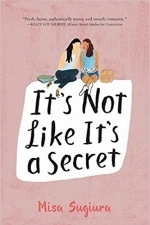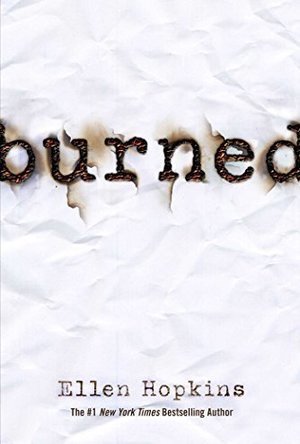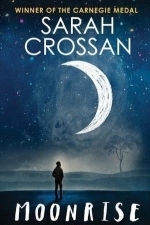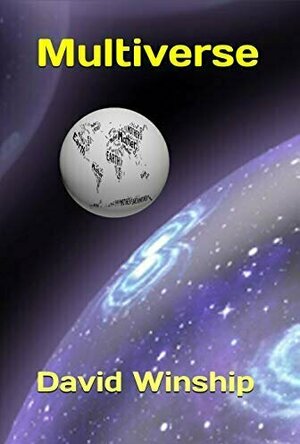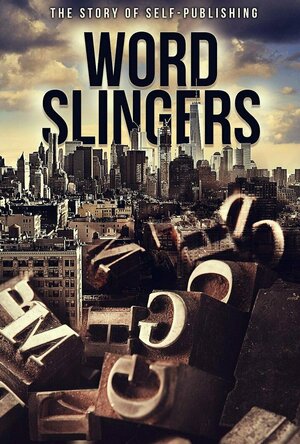Search
Goddess in the Stacks (553 KP) rated It's Not Like It's a Secret in Books
Jun 4, 2019
Sana is a California transplant from Wisconsin; both her parents are immigrants from Japan, so despite feeling like she's a midwesterner, none of her friends think of her as one. There's a cringe-y scene early in the book where she cheers with her friends about being "midwestern farmer's daughters" and they tell her she's cute for thinking that, but she's Japanese, obv. I felt really bad for her. When her family moves to California, suddenly she's not the only Asian girl in a sea of whiteness. It's an interesting mix of having a place with your own people but also fighting the stereotypes of sticking with your own ethnicity. It's assumed she'll be friends with the other Asian kids, which annoys her, but she also finds to be true; having not had the opportunity to have friends like her before, she finds she really likes it. But she also tries to break that mold and be friends with people she's not assumed to like - like Jamie Ramirez and her Hispanic friends, and Caleb and his white goth friends.
The book also explores the way racism hits races differently; the Hispanic kids get hassled by cops while the Asian kids don't - though they also have things expected of them that the Hispanic kids don't. The book gets into cultural expectations as well - PDAs are not really a thing in Sana's world, so she's reluctant to be public about her affections at school, which drives misunderstandings.
It's only in the last few chapters that all the secrets come out, and Sana struggles to put things right.
One thing I really liked about the book is the narrative structure. At the beginning of the school year, Sana's English teacher gives them a project, which is to keep a journal to transcribe poems into and talk about what they mean to you. Chapters from Sana's poetry journal are interspersed with chapters of the narrative, and give some nice insight to how she's feeling. Her love interest, Jamie, also loves poetry, and it plays a large part in their relationship.
I quite enjoyed this book.You can find all my reviews plus more at http://goddessinthestacks.com
The book also explores the way racism hits races differently; the Hispanic kids get hassled by cops while the Asian kids don't - though they also have things expected of them that the Hispanic kids don't. The book gets into cultural expectations as well - PDAs are not really a thing in Sana's world, so she's reluctant to be public about her affections at school, which drives misunderstandings.
It's only in the last few chapters that all the secrets come out, and Sana struggles to put things right.
One thing I really liked about the book is the narrative structure. At the beginning of the school year, Sana's English teacher gives them a project, which is to keep a journal to transcribe poems into and talk about what they mean to you. Chapters from Sana's poetry journal are interspersed with chapters of the narrative, and give some nice insight to how she's feeling. Her love interest, Jamie, also loves poetry, and it plays a large part in their relationship.
I quite enjoyed this book.You can find all my reviews plus more at http://goddessinthestacks.com
Dana (24 KP) rated Burned (Burned, #1) in Books
Mar 23, 2018
I honestly didn't know how I would feel about this book. I haven't been having the best week or so, so I didn't necessarily want to read something too heavy. While this book did have a lot of heavy themes, it wasn't too dark for me, which I was glad about.
The rest of this review will have some spoilers, so read at your own peril.
I didn't really know much about this book as I was going into it. My roommate gave it to me on a recommendation, so I read it the next day and I really enjoyed it. I know it came out ages ago, but I don't think I was really emotionally mature enough to really appreciate the story. Overall, I am glad I waited until I was a bit older.
Even though it is close to 550 pages, it doesn't feel that long because of the way it is set up. The poetry gives it a fresh perspective and a very interesting storytelling perspective. I absolutely loved the formatting, especially the shapes of the poems.
This book talks a lot about religion, abuse (specially religious and familial abuse), independence, sex, and relationships in a very mature, yet approachable way.
This book supports the idea that you should get help from someone when you need it-even if it is not the authorities.
It was interesting to see Pattyn's development throughout the book, as heartbreaking as it was. She starts off as such a timid, rule-abiding girl, and then turns into someone with her own thoughts and morals. I feel like that as she was able to experience more, she grew into her own person to an extent.
I love Aunt Jeanette-she just wants what is best for Pattyn.
The ending crushed me. I just wanted Pattyn to be happy with Ethan, but no. It just had to come to a horrible end, didn't it?
Sorry this review is pretty short. I can't really find all the right ways to say what I'm thinking about this book.
Overall, I enjoyed the book and I think I will check out more of Ellen Hopkins's books.
The rest of this review will have some spoilers, so read at your own peril.
I didn't really know much about this book as I was going into it. My roommate gave it to me on a recommendation, so I read it the next day and I really enjoyed it. I know it came out ages ago, but I don't think I was really emotionally mature enough to really appreciate the story. Overall, I am glad I waited until I was a bit older.
Even though it is close to 550 pages, it doesn't feel that long because of the way it is set up. The poetry gives it a fresh perspective and a very interesting storytelling perspective. I absolutely loved the formatting, especially the shapes of the poems.
This book talks a lot about religion, abuse (specially religious and familial abuse), independence, sex, and relationships in a very mature, yet approachable way.
This book supports the idea that you should get help from someone when you need it-even if it is not the authorities.
It was interesting to see Pattyn's development throughout the book, as heartbreaking as it was. She starts off as such a timid, rule-abiding girl, and then turns into someone with her own thoughts and morals. I feel like that as she was able to experience more, she grew into her own person to an extent.
I love Aunt Jeanette-she just wants what is best for Pattyn.
The ending crushed me. I just wanted Pattyn to be happy with Ethan, but no. It just had to come to a horrible end, didn't it?
Sorry this review is pretty short. I can't really find all the right ways to say what I'm thinking about this book.
Overall, I enjoyed the book and I think I will check out more of Ellen Hopkins's books.
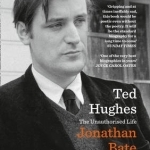
Ted Hughes: The Unauthorised Life
Book
SHORTLISTED FOR THE 2015 SAMUEL JOHNSON PRIZE 'Gripping and at times ineffably sad, this book would...

The Catholic Children’s Bible
Book and Education
App
The most loved Bible stories come to life before your eyes through vibrant images, dynamic...
I received a copy of this book from Netgalley and the publisher in exchange for an honest opinion*
I have read the majority of Sarah Crossan’s work so picking this up was a ‘no brainer’.
Edward Moon was forced to sign a confession to a crime he never committed. Moonrise is told from Joseph Moon’s perspective some 10 years later as his brother has had his date set for his execution.
Edward, Angela and Joseph didn’t have the best upbringing when they were kids, their mother was an alcoholic and neglected them. It was down to their aunt Karen to take the up the role of the parent but as a christian had very strict rules. When Edward was seventeen he left home, unable to tolerate the his aunts strict demands. His moment of freedom was short-lived as he gets incarcerated for the murder of a local policeman. 10 years on and Joseph is to make the journey to Texas to find out what really happened and to say his goodbyes as Edwards execution has been scheduled. Joseph moves in to a decrepit motel room and gets by doing chores for the local diner. His month-long stay in Texas is to get to know his brother again only to say goodbye.
This book was just OK, it deals with a topic that is not widely written about in YA books but I did prefer ‘One’ and ‘The weight of water’. In true Sarah Crossan fashion this book is written entirely in verse, it can be read as individual poems or as a story whatever your preference. This book was not as thought-provoking as her other books and whilst the topic is something that intrigues me, I felt it could have been more emotional and had more character development, the emotional side of things just wasn’t captured well in the writing and I think that’s what let it down for me. It’s probably my own fault, as I tend to go into these book with high expectations. I feel like capital punishment could have been addressed more and given the audience more awareness of executions.
Even though I thought this was only OK, I would still recommend trying it for several reasons, 1. the topic, 2. it’s written in verse. 3. Everyone else seemed to love it.
I rated this 3 out of 5 stars.
I have read the majority of Sarah Crossan’s work so picking this up was a ‘no brainer’.
Edward Moon was forced to sign a confession to a crime he never committed. Moonrise is told from Joseph Moon’s perspective some 10 years later as his brother has had his date set for his execution.
Edward, Angela and Joseph didn’t have the best upbringing when they were kids, their mother was an alcoholic and neglected them. It was down to their aunt Karen to take the up the role of the parent but as a christian had very strict rules. When Edward was seventeen he left home, unable to tolerate the his aunts strict demands. His moment of freedom was short-lived as he gets incarcerated for the murder of a local policeman. 10 years on and Joseph is to make the journey to Texas to find out what really happened and to say his goodbyes as Edwards execution has been scheduled. Joseph moves in to a decrepit motel room and gets by doing chores for the local diner. His month-long stay in Texas is to get to know his brother again only to say goodbye.
This book was just OK, it deals with a topic that is not widely written about in YA books but I did prefer ‘One’ and ‘The weight of water’. In true Sarah Crossan fashion this book is written entirely in verse, it can be read as individual poems or as a story whatever your preference. This book was not as thought-provoking as her other books and whilst the topic is something that intrigues me, I felt it could have been more emotional and had more character development, the emotional side of things just wasn’t captured well in the writing and I think that’s what let it down for me. It’s probably my own fault, as I tend to go into these book with high expectations. I feel like capital punishment could have been addressed more and given the audience more awareness of executions.
Even though I thought this was only OK, I would still recommend trying it for several reasons, 1. the topic, 2. it’s written in verse. 3. Everyone else seemed to love it.
I rated this 3 out of 5 stars.
Ivana A. | Diary of Difference (1171 KP) rated Multiverse in Books
Aug 3, 2020
<a href="https://amzn.to/2Wi7amb">Wishlist</a>; | <a
<a href="https://diaryofdifference.com/">Blog</a>; | <a href="https://www.facebook.com/diaryofdifference/">Facebook</a>; | <a href="https://twitter.com/DiaryDifference">Twitter</a>; | <a href="https://www.instagram.com/diaryofdifference/">Instagram</a>; | <a href="https://www.pinterest.co.uk/diaryofdifference/pins/">Pinterest</a>;
<img src="https://diaryofdifference.com/wp-content/uploads/2020/04/Book-Review-Banner-38.png"/>;
Multiverse is a collection of poems as well as short paragraphs that take on interesting topics and thought-provoking scenarios of our life.
After reading Multiverse, I cannot say for certain whether he is being arrogant or brave. I am still undecided as to whether I love or hate his style of writing. There is something very intriguing about his writing; sometimes he makes me smirk, and sometimes his words trigger me.
<b><i>"In a democracy, shouldn't there be room for those who don't want a fair society?"</i></b>
Even though I appreciate the style this book was written in, and the way the topics are being expressed, I am not in awe of how bombshells are dropped and then he proceeds to move on to a different subject.
Following up on this, I would also like to note the poem "Forsaking the Poppy", where the author opens us the suggestion of declining to wear a poppy. The thought process behind it is that this could be seen as synonymous with racism and chauvinism.
<b><i>One thing is certain though. </i></b>
This book will definitely leave an impact on you, whether good or bad. And it will prompt a discussion, or at least spark a bit of curiosity on various topics that are relevant in today's world.
I recommend it to all curious minds out there. It may not be your cup of tea, but you never know. As for me, I like books that either make me feel good or learn something, so i will end this review with something I learnt from this book:
<b><i>"According to ancient Japanese culture, the Sakura tree represents the beauty and fragility of life, reminding us that things in life are incredibly precious but also tragically ephemeral." </i></b>
<a href="https://amzn.to/2Wi7amb">Wishlist</a>; | <a
<a href="https://diaryofdifference.com/">Blog</a>; | <a href="https://www.facebook.com/diaryofdifference/">Facebook</a>; | <a href="https://twitter.com/DiaryDifference">Twitter</a>; | <a href="https://www.instagram.com/diaryofdifference/">Instagram</a>; | <a href="https://www.pinterest.co.uk/diaryofdifference/pins/">Pinterest</a>;
<a href="https://diaryofdifference.com/">Blog</a>; | <a href="https://www.facebook.com/diaryofdifference/">Facebook</a>; | <a href="https://twitter.com/DiaryDifference">Twitter</a>; | <a href="https://www.instagram.com/diaryofdifference/">Instagram</a>; | <a href="https://www.pinterest.co.uk/diaryofdifference/pins/">Pinterest</a>;
<img src="https://diaryofdifference.com/wp-content/uploads/2020/04/Book-Review-Banner-38.png"/>;
Multiverse is a collection of poems as well as short paragraphs that take on interesting topics and thought-provoking scenarios of our life.
After reading Multiverse, I cannot say for certain whether he is being arrogant or brave. I am still undecided as to whether I love or hate his style of writing. There is something very intriguing about his writing; sometimes he makes me smirk, and sometimes his words trigger me.
<b><i>"In a democracy, shouldn't there be room for those who don't want a fair society?"</i></b>
Even though I appreciate the style this book was written in, and the way the topics are being expressed, I am not in awe of how bombshells are dropped and then he proceeds to move on to a different subject.
Following up on this, I would also like to note the poem "Forsaking the Poppy", where the author opens us the suggestion of declining to wear a poppy. The thought process behind it is that this could be seen as synonymous with racism and chauvinism.
<b><i>One thing is certain though. </i></b>
This book will definitely leave an impact on you, whether good or bad. And it will prompt a discussion, or at least spark a bit of curiosity on various topics that are relevant in today's world.
I recommend it to all curious minds out there. It may not be your cup of tea, but you never know. As for me, I like books that either make me feel good or learn something, so i will end this review with something I learnt from this book:
<b><i>"According to ancient Japanese culture, the Sakura tree represents the beauty and fragility of life, reminding us that things in life are incredibly precious but also tragically ephemeral." </i></b>
<a href="https://amzn.to/2Wi7amb">Wishlist</a>; | <a
<a href="https://diaryofdifference.com/">Blog</a>; | <a href="https://www.facebook.com/diaryofdifference/">Facebook</a>; | <a href="https://twitter.com/DiaryDifference">Twitter</a>; | <a href="https://www.instagram.com/diaryofdifference/">Instagram</a>; | <a href="https://www.pinterest.co.uk/diaryofdifference/pins/">Pinterest</a>;
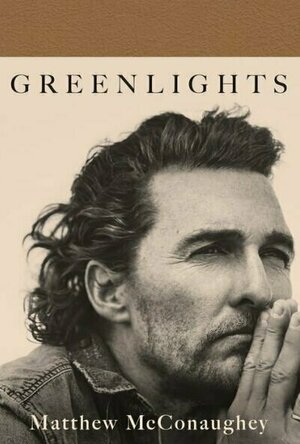
Greenlights
Book
From the Academy Award®–winning actor, an unconventional memoir filled with raucous stories,...
Jesters_folly (230 KP) rated Blinded by the Light (2019) in Movies
Jul 10, 2019
One of the joys of having a cinema card are the previews, because you chose to pay monthly or yearly for unlimited films you get to see some films early, this can be anything from a day to a month. Then there are the secret films, a preview that can be a few months early but you only find out what you are seeing when the certificate card comes up. This is how I came to see Blinded by the Light. As the title came up I dug through my memory to see if I'd seen any trailers, I thought I had but couldn't remember anything about it. Five people left cinema so there must have been some trailers but people leaving doesn't really tell you much, there's always some one who leaves and it's better than the people who stay and mumble about how rubbish it is. After the title came the words ‘Inspired by real events.’ Which still doesn't give to much away, it could be an over the top farce like ‘I Tonya', a black comedy like ‘Three Billboards’ or a dull trudge like ‘The Post'.
It turns out that 'Blinded by the Light' is not really any of these, it's more of a 'slice of life' it the slice is a couple of years. The film centres on Javed, a Pakistani teen living in Luton, England in the late 1980s. Javed has written diaries and poems for most of his life but, due to his family life he has always kept them to himself. Not long after starting his A levels Javed is introduced to the music of Bruce Springsteen and finds that the lyrics speak to him in a way he's never felt before.
Blinded by the Light is a film about family, friends and finding your place. Javed starts off as a quiet, bookish character who, thanks to the people around him and his growing love of Bruce Springsteen records manages to find himself. However, this change leaded to problems as he clash’s with family and friends.
Being set in 80s and being about a Pakistani family the film also touches on the problem of racism and, from the clips I remembered from the trailer I found myself wondering if it was going to erupt into violence in the style of films like 'Made in England'. However, 'blinded by the Light' takes a more family friendly view, it does show some racism but less ‘violent’ and more personal making ‘Blinded by the Light’ a more family friendly film.
Although music plays a large part of the film it is not the music itself that’s important but the effect that it has on Javed, showing how the right music can change someone’s life.
It turns out that 'Blinded by the Light' is not really any of these, it's more of a 'slice of life' it the slice is a couple of years. The film centres on Javed, a Pakistani teen living in Luton, England in the late 1980s. Javed has written diaries and poems for most of his life but, due to his family life he has always kept them to himself. Not long after starting his A levels Javed is introduced to the music of Bruce Springsteen and finds that the lyrics speak to him in a way he's never felt before.
Blinded by the Light is a film about family, friends and finding your place. Javed starts off as a quiet, bookish character who, thanks to the people around him and his growing love of Bruce Springsteen records manages to find himself. However, this change leaded to problems as he clash’s with family and friends.
Being set in 80s and being about a Pakistani family the film also touches on the problem of racism and, from the clips I remembered from the trailer I found myself wondering if it was going to erupt into violence in the style of films like 'Made in England'. However, 'blinded by the Light' takes a more family friendly view, it does show some racism but less ‘violent’ and more personal making ‘Blinded by the Light’ a more family friendly film.
Although music plays a large part of the film it is not the music itself that’s important but the effect that it has on Javed, showing how the right music can change someone’s life.
Bob Mann (459 KP) rated Wordslingers: The Story of Self-Publishing (2021) in Movies
Sep 28, 2021
They say that everyone has a book in them. I guess the key question is whether anyone else wants to read it. Such is the subject of this new documentary from A. Brooks Bennett. As a publisher says at one point “Writing a book is a creative act; publishing a book is a business”.
The democratization of publishing
The internet has brought many advantages to modern life, but perhaps one of the most interesting is the democratization of publishing. No longer is control in the hands of publishing houses, who might glance at and immediately dismiss new ideas in literature. It’s worth remembering that 12 publishing houses turned down J.K. Rowling’s draft for Harry Potter! Now anyone can be creative in writing and self-publish on the web. My own wife – Sue Mann – did just this, self-publishing the WW1 poems and reminiscences of two of her great-uncles. (It’s available from all good bookshops… oh, no…. actually just from here!) Are the poems artistically any good? I have no idea! Will it sell many copies? Clearly not! Was it a personal goal achieved in honouring their memory? Absolutely! Different people want different things from the medium.
Very ‘American’.
It’s probably down to the pioneer spirit, but as a generalisation Americans seem far more ambitious than Brits: or at least, more OPENLY ambitious. Whereas most Brits will quietly get on with building their careers, some Americans will go hell-for-leather towards their vision of “success” no matter the cost: no guts; no glory; and be noisy about it!
But for every J.K. Rowling or Bill Bryson there are several thousand writers who have ‘failed to launch’.
Here we follow two budding authors – one from California; the other from North Carolina – self-publishing their work and seeking sales.
One – Giles A (“Andy”) Anderson – has self-published a seemingly disturbing work called “Vidu” – the first of what he hopes will be a five-part series. He first talks from a ghoulish bookstore, speaking psycho-babble with the requisite hyperbole of an ‘artiste’. (It suggests how the books might read… but perhaps that’s misjudging). It comes then as a surprise when we find he doesn’t live alone in a coffin playing video games on his own, but has a lovely wife and two young and perfectly normal children. So his book is an “off the beaten track kinda book”, but the man seems well-grounded and following his dream in bite-size pieces.
Moral: Avoid the Travel Books
As is often the case though, the documentary homes in on, and spends most of its time with, the other author – Adam Shephard. Shephard is struggling to launch as an author and also – in parallel – wrestling with the Green Card process for his supportive and vivacious Croatian wife Ivana. The problem is that Shephard has written an extended travel blog: ten-a-penny on sites like WordPress.
I read a Forbes article last year that reported that – astonishingly – in a survey 11% of American respondents had never travelled outside of their home state and 40% had never left the country. For such a well-heeled country, the US is incredibly insular. So Shephard’s vision is to encourage youngsters to step outside of their comfort zone and jump on that plane to Guatemala. It’s a fine objective. But does anyone want to listen? And – crucially – is the book any good and commercial enough? As the famous ‘founder of self-publishing’, the late Dan Poynter (to who the film is dedicated) says “You can’t make any money off a travel book”.
The film never goes as far as having either of the featured books critically reviewed: that might have added some extra spice to the story (and possibly provoked some painful reactions). But the piles of unopened boxes in Adam’s clinically white storage facility rather speaks for itself. Since Shephard never seems to do anything by halves, the boxes are piled high and thus the fall from grace is hard, long…. and absolutely riveting. (Ivana’s support and love in such difficult circumstances is commendable: he is a truly blessed man).
Jaw-dropping Walmart scene
At least at the start of the film, Adam’s self-belief and confidence in himself is infectious. The peak of his bravado, and a jaw-dropping highpoint in the movie for me, was a scene filmed in Walmart. Shephard, in a case of “reverse shoplifting”, sneaks HIS books onto the bookshelves of Walmart. What happens when they then try to buy one? It’s a real eye-opener and worth watching the documentary for in its own right.
It’s an interesting legal position: if Walmart were to be upset about this scene, what on earth could they charge them with!? Littering?
Highs and lows.
Shephard seems to have talent as a speaker, and it struck me that he would be genuinely suited to a job in sales. In the movie we see him performing self-confidence-building pitches to young people (and, boy, could we sometimes use that in the UK post-Brexit). A few books sold. But another event barely breaking even. The pattern becomes familiar and, in a way, rather tragic.
There are unexpected highs and lows for Adam and Ivana along the way though, unrelated to the publishing story, and the filmmaker skillfully weaves them into the narrative to good effect.
Thought-provoking.
I watched this on a whim and thought I’d probably switch off after 10 minutes. Documentaries normally are not my thing! But no. It had me gripped to see how things would turn out – like watching a slow-motion car crash! The journey was well-worth the ride: a real page-turner you might say.
The democratization of publishing
The internet has brought many advantages to modern life, but perhaps one of the most interesting is the democratization of publishing. No longer is control in the hands of publishing houses, who might glance at and immediately dismiss new ideas in literature. It’s worth remembering that 12 publishing houses turned down J.K. Rowling’s draft for Harry Potter! Now anyone can be creative in writing and self-publish on the web. My own wife – Sue Mann – did just this, self-publishing the WW1 poems and reminiscences of two of her great-uncles. (It’s available from all good bookshops… oh, no…. actually just from here!) Are the poems artistically any good? I have no idea! Will it sell many copies? Clearly not! Was it a personal goal achieved in honouring their memory? Absolutely! Different people want different things from the medium.
Very ‘American’.
It’s probably down to the pioneer spirit, but as a generalisation Americans seem far more ambitious than Brits: or at least, more OPENLY ambitious. Whereas most Brits will quietly get on with building their careers, some Americans will go hell-for-leather towards their vision of “success” no matter the cost: no guts; no glory; and be noisy about it!
But for every J.K. Rowling or Bill Bryson there are several thousand writers who have ‘failed to launch’.
Here we follow two budding authors – one from California; the other from North Carolina – self-publishing their work and seeking sales.
One – Giles A (“Andy”) Anderson – has self-published a seemingly disturbing work called “Vidu” – the first of what he hopes will be a five-part series. He first talks from a ghoulish bookstore, speaking psycho-babble with the requisite hyperbole of an ‘artiste’. (It suggests how the books might read… but perhaps that’s misjudging). It comes then as a surprise when we find he doesn’t live alone in a coffin playing video games on his own, but has a lovely wife and two young and perfectly normal children. So his book is an “off the beaten track kinda book”, but the man seems well-grounded and following his dream in bite-size pieces.
Moral: Avoid the Travel Books
As is often the case though, the documentary homes in on, and spends most of its time with, the other author – Adam Shephard. Shephard is struggling to launch as an author and also – in parallel – wrestling with the Green Card process for his supportive and vivacious Croatian wife Ivana. The problem is that Shephard has written an extended travel blog: ten-a-penny on sites like WordPress.
I read a Forbes article last year that reported that – astonishingly – in a survey 11% of American respondents had never travelled outside of their home state and 40% had never left the country. For such a well-heeled country, the US is incredibly insular. So Shephard’s vision is to encourage youngsters to step outside of their comfort zone and jump on that plane to Guatemala. It’s a fine objective. But does anyone want to listen? And – crucially – is the book any good and commercial enough? As the famous ‘founder of self-publishing’, the late Dan Poynter (to who the film is dedicated) says “You can’t make any money off a travel book”.
The film never goes as far as having either of the featured books critically reviewed: that might have added some extra spice to the story (and possibly provoked some painful reactions). But the piles of unopened boxes in Adam’s clinically white storage facility rather speaks for itself. Since Shephard never seems to do anything by halves, the boxes are piled high and thus the fall from grace is hard, long…. and absolutely riveting. (Ivana’s support and love in such difficult circumstances is commendable: he is a truly blessed man).
Jaw-dropping Walmart scene
At least at the start of the film, Adam’s self-belief and confidence in himself is infectious. The peak of his bravado, and a jaw-dropping highpoint in the movie for me, was a scene filmed in Walmart. Shephard, in a case of “reverse shoplifting”, sneaks HIS books onto the bookshelves of Walmart. What happens when they then try to buy one? It’s a real eye-opener and worth watching the documentary for in its own right.
It’s an interesting legal position: if Walmart were to be upset about this scene, what on earth could they charge them with!? Littering?
Highs and lows.
Shephard seems to have talent as a speaker, and it struck me that he would be genuinely suited to a job in sales. In the movie we see him performing self-confidence-building pitches to young people (and, boy, could we sometimes use that in the UK post-Brexit). A few books sold. But another event barely breaking even. The pattern becomes familiar and, in a way, rather tragic.
There are unexpected highs and lows for Adam and Ivana along the way though, unrelated to the publishing story, and the filmmaker skillfully weaves them into the narrative to good effect.
Thought-provoking.
I watched this on a whim and thought I’d probably switch off after 10 minutes. Documentaries normally are not my thing! But no. It had me gripped to see how things would turn out – like watching a slow-motion car crash! The journey was well-worth the ride: a real page-turner you might say.

Public Speaking Teleprompter Presenter Audio/Video
Business and Photo & Video
App
Speechmaker turns an iPhone or iPad into your personal mobile podium. Create, archive, rehearse,...
